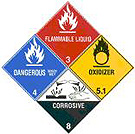 Just as you would in your house, your paint booth filters must be changed to protect the quality of air you breathe and the environment. For the health of painters, spray-painting operations must use paint booths with exhaust filters. Exhaust filters are designed to collect paint and other particles, preventing them from polluting the air outside the shop with paint overspray. Because the paint being collected on the filters can be hazardous, it can also make the used filter potentially hazardous. So how do you know if your booth filters are considered hazardous waste?
Just as you would in your house, your paint booth filters must be changed to protect the quality of air you breathe and the environment. For the health of painters, spray-painting operations must use paint booths with exhaust filters. Exhaust filters are designed to collect paint and other particles, preventing them from polluting the air outside the shop with paint overspray. Because the paint being collected on the filters can be hazardous, it can also make the used filter potentially hazardous. So how do you know if your booth filters are considered hazardous waste?
1.) Evaluate Your Filters. No matter which type of exhaust filter you use, all types must be evaluated to determine whether or not they are hazardous. Avoid conditions that could lead to spontaneous combustion in dumpsters. Both hazardous and non-hazardous filters have been known to spontaneously combust.
2.) How Can You Determine Hazardous Filters? Determining a hazardous filter can be done in two ways.
a.) Through knowledge of waste
-Only use paints and coatings which contain regulated metals.
b.) Use of laboratory testing
-Arrange a testing with a company capable of performing TCLP (Toxicity Characteristic Leaching Procedure) test.
Get more information on paint booths, filters and environmental concerns from the Environmental Protection Agency.
If your filters are hazardous, you must store them in a non-leaking container marked with the words “Hazardous Waste” with the waste description attached. To select the proper container you may want to contact the disposal facility you are planning to use. A licensed hazardous waste transporter is required to ship the hazardous waste to the disposal facility. A special paper called a hazardous waste manifest must be accompanied with the shipment.
Non-hazardous filters cannot be disposed of in or with your normal trash. Your waste is to be sent to a permitted landfill or burner by a waste hauler. Make sure filters and the paints they contain are completely dry prior to disposal to minimize the chance of fire.
In North Carolina, if the paint on the filters is DRY then it is not considered Hazardous. If the paint is WET, then it is Hazardous. Consult with your jobber, filter supplier, and/or your local authorities for assistance in properly characterizing and handling your waste filters.

